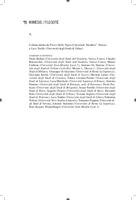Il Fantasma dell’Io. La massa e l’inconscio mimetico: The Phantom of the Ego: Modernism and the Mimetic Unconscious
Author(s)
Lawtoo, Nidesh
Collection
European Research Council (ERC); EU collectionLanguage
ItalianAbstract
A ghost roams the modern world: "the ghost of the ego" With this sentence, Friedrich Nietzsche offers a diagnosis of the modern self that finds the royal road to the unconscious in mass imitation. In the footsteps of Nietzsche, modernist authors such as Joseph Conrad, DH Lawrence, Georges Bataille - read in dialogue with human sciences such as anthropology and psychoanalysis, research on hypnosis and mass psychology - question themselves about reflected mimetic phenomena that do not they are under the rational control of consciousness and are, in this sense, in-conscious. From identification to affective contagion, passing through sympathy and laughter, violence and magic, hypnosis and suggestion, the mimetic unconscious reveals how modernist authors make our concept of "I" new because they anticipate recent developments in neuroscience. They also offer us an out-of-date mirror to reflect critically on the becoming of our "I" as well as on the power of authoritarian leaders - past and present - to transform the mass subject into a copy or a "ghost of the ego". Un fantasma si aggira per il mondo moderno: "il fantasma dell'io." Con questa frase, Friedrich Nietzsche offre una diagnosi dell'io moderno che trova nell'imitazione di massa la via regia all'inconscio. Sulle orme di Nietzsche, autori modernisti come Joseph Conrad, D. H. Lawrence, Georges Bataille - letti in dialogo con scienze umane come l'antropologia e la psicanalisi, le ricerche sull'ipnosi e la psicologia di massa - si interrogano su fenomeni mimetici riflessi che non sono sotto il controllo razionale della coscienza e che sono, in questo senso, in-consci. Dall'identificazione al contagio affettivo, passando per la simpatia e il riso, la violenza e la magia, l'ipnosi e la suggestione, l'inconscio mimetico rivela come autori modernisti rendono il nostro concetto di "io" nuovo perché anticipano recenti sviluppi nelle neuroscienze. Ci offrono pure uno specchio inattuale per riflettere criticamente sul divenire del nostro "io" così come sul potere dei leader autoritari - passati e presenti - di trasformare il soggetto di massa in una copia o un "fantasma dell'io".
Keywords
PhilosophyOCN
1135846121Publisher
MimesisPublication date and place
2018Grantor
Classification
Philosophy


 Download
Download